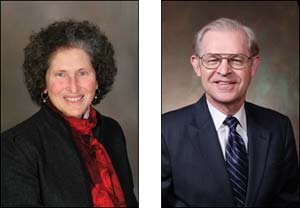Candidates limited by financing
By: Jack Zemlicka, [email protected]//February 23, 2011//
 The surviving candidates for the Wisconsin Supreme Court know they each have an additional $300,000 to spend between now and April 5, which theoretically, creates a level playing field in terms of advertising.
The surviving candidates for the Wisconsin Supreme Court know they each have an additional $300,000 to spend between now and April 5, which theoretically, creates a level playing field in terms of advertising.
But it’s unknown to what extent outside interest groups will invest in either incumbent Justice David T. Prosser or Assistant Attorney General JoAnne F. Kloppenburg.
Given that public financing limits the amount of exposure candidates can buy, observers suggested outside interest could be high.
“Ironically, public financing probably will make outside groups more influential,” said Barry Burden, a political science professor at University of Wisconsin-Madison. “Because the candidates are constrained in what they can spend, the deep pockets of independent groups will carry more weight.”
Burden said that is problematic because it takes control of the campaign from the candidates and because the law doesn’t force most of those groups to reveal their donors, there’s a lack of transparency.
So far, only Club for Growth Wisconsin rolled out a pre-primary television advertisement in support of Prosser.
While Kloppenburg’s campaign was critical of the ad, Prosser said he has yet to see it, much less had any contact with the organization.
He acknowledged there is nothing candidates can do to prevent outside groups from running issue ads and it would depend on whether content is rooted in truth, as to whether he would publicly respond to them.
“Let’s say someone legitimately criticized (Kloppenburg),” Prosser said. “Am I going to say no? I don’t think that’s really in my province.”
Kloppenburg’s campaign manager Melissa Mulliken said ideally, any political ads should be accurate and definable in terms of the facts.
In the context of the Supreme Court race, she said the Government Accountability Board showed how it will interpret issue ads with the Club for Growth spot.
“The Club for Growth ad didn’t say vote for or against, so it didn’t trigger any additional money,” Mulliken said.
Regardless of the tone of expected third-party ads, University of Wisconsin-Madison political science professor John Coleman doesn’t expect they will significantly change the minds of voters. He said the primary effect of third-party involvement will likely be to motivate turnout.
Liberal groups have a strong incentive to try and gain a majority on the court, Coleman said, and unions may want to use this race as a chance to flex their muscle in the wake of the budget repair bill.
But for the same reasons, he suggested conservative groups have an incentive to spend heavily as well.
“No one is expecting to swing 10 or 15 percent of the votes with their ads,” Coleman said. “If you can swing one or two percent, that may be the difference between victory and defeat.”
Jack Zemlicka can be reached at [email protected].
Legal News
- More human remains believed those of missing woman wash up on Milwaukee Co. beach
- Vice President Harris returning to Wisconsin for third visit this year
- Wisconsin joins Feds, dozens of states to hold airlines accountable for bad behavior
- Trump ahead of Biden in new Marquette poll
- Bankruptcy court approves Milwaukee Marriott Downtown ‘business as usual’ motion
- New Crime Gun Intelligence Center to launch in Chicago
- Arrest warrant proposed for Minocqua Brewing owner who filed Lawsuit against Town of Minocqua
- Wisconsin Supreme Court justices question how much power Legislature should have
- Reinhart named the 2024 Wisconsin law firm of the year by benchmark litigation
- Milwaukee’s Common Council now has the most African Americans, women and openly LGBTQ members ever
- Office of School Safety Provides Behavioral and Threat Assessment Management Training Ahead of 25th Anniversary of Columbine Shooting
- Wisconsin Supreme Court to hear arguments in Democratic governor’s suit against GOP-led Legislature
WLJ People
- Power 30 Personal Injury Attorneys – Russell Nicolet
- Power 30 Personal Injury Attorneys – Benjamin Nicolet
- Power 30 Personal Injury Attorneys – Dustin T. Woehl
- Power 30 Personal Injury Attorneys – Katherine Metzger
- Power 30 Personal Injury Attorneys – Joseph Ryan
- Power 30 Personal Injury Attorneys – James M. Ryan
- Power 30 Personal Injury Attorneys – Dana Wachs
- Power 30 Personal Injury Attorneys – Mark L. Thomsen
- Power 30 Personal Injury Attorneys – Matthew Lein
- Power 30 Personal Injury Attorneys – Jeffrey A. Pitman
- Power 30 Personal Injury Attorneys – William Pemberton
- Power 30 Personal Injury Attorneys – Howard S. Sicula











